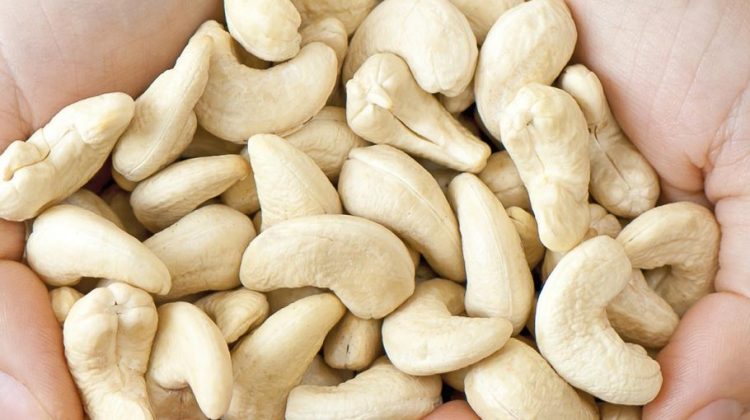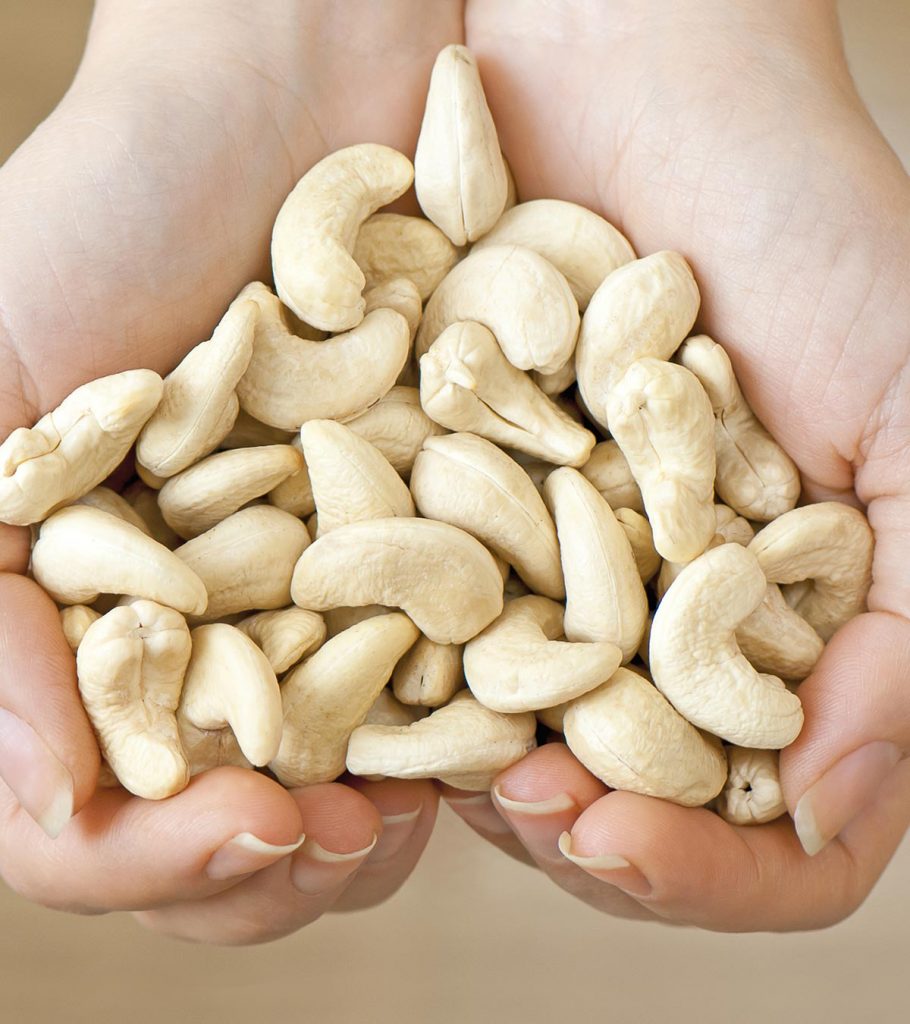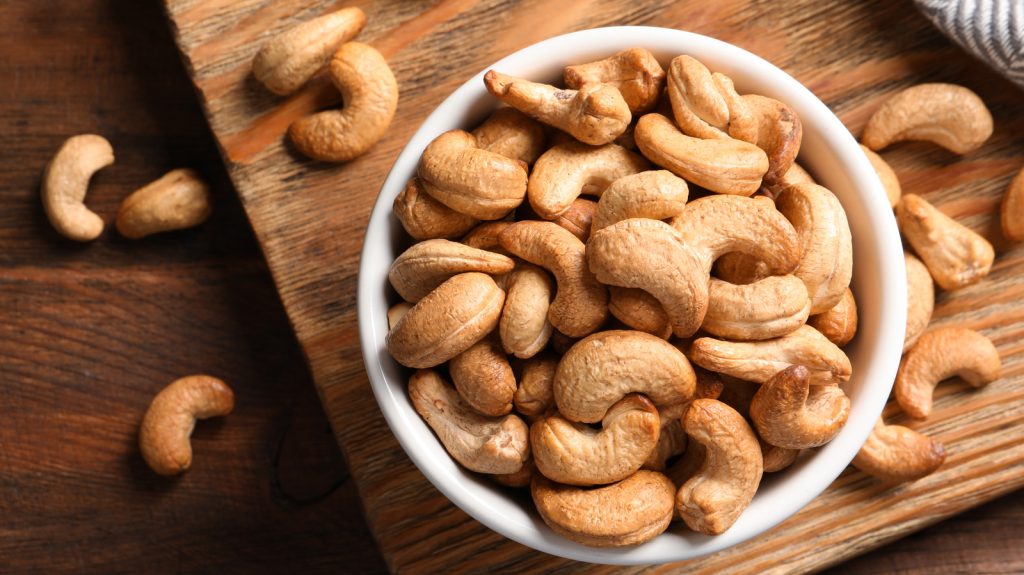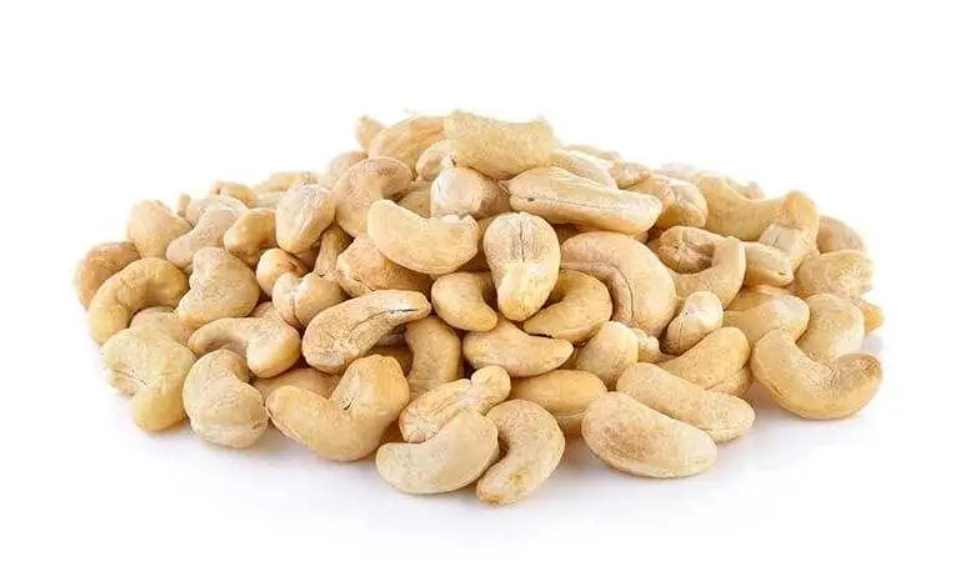

In this blog, we’ll explore the nutritional wonders of cashews and unveil the 15 remarkable ways they can boost your well-being. From heart-healthy fats to bone-strengthening minerals, cashews have a lot to offer. Join us on this journey to find out why cashew nuts could be your new favorite snack for a healthier you.
What are cashew nuts?

Cashew nuts are seeds from the cashew tree, grown mainly in tropical regions. They’re known for their mild, creamy taste and are used in various dishes and snacks. Cashews are rich in healthy fats, vitamins, minerals, and protein. They’re often processed into cashew butter or used in dairy alternatives. Remember, they’re calorie-dense, so enjoy them in moderation.
Nutritional value of cashew nuts.
Cashew nuts are not only delicious but also nutritious. Here’s a summary of their nutritional value per 1-ounce (28-gram) serving, which is approximately 18 cashew nuts:
- Calories: Approximately 157 calories
- Fat: About 12 grams, primarily monounsaturated and polyunsaturated fats
- Protein: Roughly 5 grams
- Carbohydrates: Around 9 grams, including 1 gram of dietary fiber and 2 grams of sugar
- Vitamins: Cashews are a good source of various vitamins, including vitamin K, vitamin E, and several B vitamins like thiamine (B1), riboflavin (B2), niacin (B3), vitamin B6, and folate (B9).
- Minerals: They provide essential minerals, including magnesium, phosphorus, potassium, copper, zinc, and iron.
- Other Nutrients: Cashews also contain antioxidants like selenium and small amounts of plant compounds such as phytosterols.
15 effects of eating cashew nuts.
Nutrient-rich

Cashew nuts are a powerhouse of essential nutrients, making them a valuable addition to your diet. They’re packed with vitamins such as B vitamins (thiamine, riboflavin, niacin, and folate) that play crucial roles in energy metabolism and overall health. Additionally, they provide minerals like magnesium, iron, zinc, and copper, which are vital for various bodily functions, including immune support and enzyme activity.
Heart health

Cashews’ heart-healthy benefits extend beyond just their healthy fats.
They contain arginine, an amino acid that may help improve blood vessel function, potentially reducing the risk of cardiovascular diseases.
The unsaturated fats in cashews, including oleic acid, have been associated with lower LDL cholesterol levels, contributing to a healthier heart.
Weight management

Despite their calorie density, cashews can be a helpful addition to a balanced diet. Their combination of protein and dietary fiber helps promote feelings of fullness, making it less likely for you to overeat and aiding in weight management efforts when consumed in moderation.
Antioxidant properties

Cashews contain antioxidants like vitamin E, which can help neutralize harmful free radicals in the body. This antioxidative protection may contribute to reduced cellular damage and a lower risk of chronic diseases over time.
Bone health

Calcium, magnesium, and phosphorus in cashews are essential for maintaining strong bones and teeth. Regular consumption can support bone density and reduce the risk of osteoporosis, especially when combined with other calcium-rich foods.
Blood pressure regulation

Cashews’ potassium content is a valuable nutrient for regulating blood pressure. Adequate potassium intake helps balance sodium levels in the body and relaxes blood vessels, potentially lowering the risk of hypertension and associated complications.
Blood sugar control

Some studies have suggested that incorporating cashews into your diet may help improve blood sugar control. Their blend of healthy fats and fiber can slow down the absorption of sugars, aiding in more stable blood glucose levels.
Eye health

Cashews contain eye-friendly antioxidants like lutein and zeaxanthin, which protect the eyes from harmful UV rays and oxidative stress. Regular consumption may reduce the risk of age-related macular degeneration and cataracts.
Skin health

The healthy fats and antioxidants found in cashews can help maintain healthy, glowing skin. They combat inflammation and promote collagen production, potentially reducing the appearance of wrinkles and blemishes.
Digestive health

Cashews are a valuable source of dietary fiber, aiding in regular bowel movements and a healthy digestive system. Fiber also supports the growth of beneficial gut bacteria, contributing to overall digestive well-being.
Muscle health

Cashews provide a source of protein, an essential macronutrient for muscle repair and growth. Including them in a balanced diet can help maintain muscle mass and aid in recovery after physical activity.
Energy boost

The combination of healthy fats and carbohydrates in cashews can provide a quick energy boost when needed. They make for an excellent snack choice before or after exercise or when you’re feeling fatigued.
Immune support

Cashews contain zinc, a mineral known for its immune-boosting properties. Adequate zinc intake helps support immune function and can aid in the body’s defense against infections and illnesses.
Cognitive health

The magnesium and vitamin K in cashews play essential roles in cognitive function and memory. Including them in your diet may contribute to improved mental clarity and overall brain health.
Stress reduction

Cashews’ magnesium content is also associated with stress reduction and relaxation. Magnesium helps relax blood vessels, potentially promoting a sense of calm and better sleep quality.
Side effects of cashew nuts.

Cashew nuts, while undeniably nutritious and delicious, can pose certain side effects and considerations.
Allergies to cashews are a notable concern, as they can trigger mild to severe allergic reactions. Their calorie density can contribute to weight gain if not consumed in moderation, and excessive intake may lead to digestive discomfort.
Cashews contain oxalates, which, in some individuals, can contribute to kidney stone formation, and their phytic acid content may hinder the absorption of certain minerals.
Furthermore, potential fungal contamination and high sodium content in salted varieties should be monitored. While cashews have many health benefits, it’s essential to exercise portion control and consider individual dietary and health factors when including them in your diet.
Who should avoid cashews?

- Nut Allergy: Individuals with known nut allergies, including cashew allergies, should completely avoid cashews to prevent allergic reactions, which can range from mild itching and swelling to severe anaphylaxis, a life-threatening condition.
- Kidney Stones: People who have a history of kidney stones may want to limit their cashew intake due to their oxalate content, which can contribute to the formation of kidney stones in some cases.
- Weight Management: Those who are actively trying to lose weight should be cautious with cashews due to their calorie density. While they can be a healthy part of a weight loss plan in moderation, excessive consumption can hinder weight management efforts.
- Salt Sensitivity: If you have high blood pressure or are sensitive to sodium, choose unsalted cashews or consume them in moderation, as some commercially processed varieties can be high in salt.
- Diabetes: People with diabetes should be mindful of portion sizes when including cashews in their diet, as they contain carbohydrates that can affect blood sugar levels.
- Gastrointestinal Issues: Individuals with certain gastrointestinal conditions, such as irritable bowel syndrome (IBS) or diverticulitis, may find that cashews can trigger digestive discomfort due to their fat and fiber content.
- Dental Health: Cashews are crunchy and can be abrasive to dental enamel. People with dental issues or sensitivity should consume them with caution and practice good oral hygiene.
Frequently Asked Questions?
Are Cashew Nuts good for you ?
Cashew nuts are undeniably a nutritious addition to your diet. They offer a blend of healthy fats, protein, vitamins, and minerals that can support heart health, bone strength, and overall well-being.
Their monounsaturated and polyunsaturated fats can help lower bad cholesterol levels, while their wealth of essential nutrients contributes to various bodily functions.
However, it’s crucial to consume them in moderation due to their calorie density, and individuals with nut allergies should exercise caution. When enjoyed as part of a balanced diet, cashew nuts can be a tasty and healthful snack.
Are honey roasted cashew good for you?
Honey roasted cashews, while delicious, should be enjoyed in moderation. While they do provide some of the benefits of cashews, such as healthy fats and protein, the honey-roasting process often adds extra sugar and calories.
This can lead to an increase in overall calorie intake and potentially hinder weight management efforts if consumed excessively.
If you’re looking for a healthier snack, it’s advisable to choose plain, unsalted cashews to maximize their nutritional benefits without the added sugars and calories associated with honey-roasting.
Are Cashew Nuts good for you to lose weight ?
Cashew nuts can be a valuable addition to a weight loss plan when consumed mindfully.
Their combination of protein, healthy fats, and dietary fiber can promote feelings of fullness and satiety, potentially reducing overall calorie intake.
However, due to their calorie density, portion control is crucial to avoid excess calorie consumption.
Including cashews as a snack or in meals can add nutritional value and help curb unhealthy cravings, supporting your weight loss goals when part of a balanced diet and active lifestyle.
Are roasted Cashew Nuts good for you?
Roasted cashew nuts can be a tasty and nutritious addition to your diet when enjoyed in moderation.
The roasting process enhances their flavor and makes them more digestible.
Cashews provide healthy fats, protein, vitamins, and minerals that can support heart health and overall well-being. However, it’s important to be mindful of portion sizes, as roasted cashews can be calorie-dense.
Opt for unsalted or lightly salted varieties to control sodium intake. Including them as a part of a balanced diet can make roasted cashew nuts a satisfying and nutritious snack option.
Are Almonds and Cashew Nuts good for you?
Both almonds and cashew nuts are excellent choices for a healthy diet.
Almonds are packed with vitamins, minerals, and healthy fats, making them beneficial for heart health and weight management. They also provide a good source of dietary fiber and protein.
Cashew nuts, on the other hand, offer a similar nutritional profile, with a focus on heart-healthy monounsaturated fats and various essential nutrients.
Both nuts can be part of a balanced diet and provide a range of health benefits when consumed in moderation.
However, be mindful of portion sizes due to their calorie content, and opt for unsalted varieties for the best nutritional impact.
Are Cashew Nuts good for your heart?
Yes, cashew nuts can be beneficial for heart health.
They are a good source of heart-healthy monounsaturated and polyunsaturated fats, which can help lower bad cholesterol levels and reduce the risk of heart disease.
Cashews provide essential minerals like magnesium and potassium, which play a role in maintaining healthy blood pressure and cardiovascular function.
The antioxidants and fiber in cashews further contribute to heart health by reducing inflammation and supporting overall well-being.
However, it’s essential to consume them in moderation as part of a balanced diet to reap these heart-protective benefits without excess calorie intake.
Are Cashews good for your liver and kidney?
Cashews can be beneficial for liver and kidney health when consumed as part of a balanced diet.
They contain essential nutrients like magnesium and antioxidants that can support overall well-being.
Magnesium, in particular, plays a role in detoxifying the liver and kidney functions.
It’s important to eat cashews in moderation, as their oxalate content may contribute to kidney stone formation in some individuals if consumed excessively.
As with any food, a balanced approach to incorporating cashews into your diet is key to maximizing their health benefits while minimizing potential risks to your liver and kidneys.
Are Cashew Nuts good for your brain and teeth?
Cashew nuts can indeed benefit both your brain and teeth. They contain essential nutrients like magnesium and vitamin K, which support cognitive function and may help improve memory.
The healthy fats in cashews also contribute to brain health by maintaining the integrity of cell membranes.
The minerals found in cashews, such as calcium and phosphorus, promote strong teeth and overall dental health.
However, it’s essential to enjoy cashews in moderation due to their calorie content and maintain good oral hygiene practices for optimal teeth health.
What is the side effect of eating cashew nut?
One potential side effect of eating cashew nuts is an allergic reaction, as they can trigger mild to severe allergic symptoms in some individuals.
Excessive consumption can lead to weight gain due to their calorie density, and their oxalate content may contribute to kidney stone formation in susceptible individuals.
It’s important to enjoy cashews in moderation and be aware of any allergies or dietary restrictions you may have.
How many cashews should you eat a day for health benefits?
For health benefits, consuming a small portion of cashews daily is recommended.
Around 1 ounce (28 grams), which is roughly 18 cashews, can provide essential nutrients and contribute to heart health, bone strength, and overall well-being.
However, it’s crucial to be mindful of portion sizes as cashews are calorie-dense, and excessive consumption can lead to weight gain.
Moderation is key to maximizing their health advantages while maintaining a balanced diet.
Does cashew increase sperm count?
There’s no conclusive scientific evidence to suggest that cashews or any specific food can directly increase sperm count.
However, maintaining a balanced and nutritious diet, which includes nuts like cashews as part of a healthy lifestyle, can support overall reproductive health.
Factors such as overall diet, lifestyle, and individual health play more significant roles in sperm count and fertility. If concerns about fertility exist, it’s advisable to consult a healthcare professional for a comprehensive evaluation and personalized guidance.
Which nut is best for sperm?
Among nuts, walnuts are often considered one of the best choices for sperm health.
They contain high levels of omega-3 fatty acids, antioxidants, and other nutrients that can potentially promote better sperm quality and motility. It’s essential to maintain a balanced diet overall and lead a healthy lifestyle to support optimal sperm health rather than relying solely on one type of nut.
Consulting with a healthcare professional for personalized advice on fertility and reproductive health is recommended if concerns exist.
Almonds are often considered one of the healthiest nuts to eat due to their rich nutritional profile, including heart-healthy fats, fiber, and essential vitamins and minerals.
Cashew nuts can be a nutritious snack for pregnant women, providing essential nutrients like folate and healthy fats. However, they should be consumed in moderation, considering their calorie density, and any allergies or dietary restrictions should be considered.
Fruits like bananas and citrus fruits are rich in vitamins, antioxidants, and essential nutrients that can potentially support sperm health. However, a balanced diet and overall lifestyle factors play a more significant role in improving sperm quality.
Consuming too many cashew nuts can lead to excessive calorie intake, potentially causing weight gain. Their high-fat content may lead to digestive discomfort, and their oxalate content could contribute to kidney stone formation in some individuals if consumed excessively. Moderation is essential when enjoying cashew nuts.
Related Articles
Top 21 Healthiest Peanut Butter to Buy
Black-Eyed Peas (Cowpeas): Benefits And Nutrition Facts
17 low calorie filling snacks that will make you feel full.
13 Best Low Carb Keto Bread to Buy in 2023
15 Incredible health benefits of bitter kola /4 Side effects
Supercharge Your Day: The Benefits of Eating Lunch
Conclusion
In conclusion, cashew nuts offer a range of health benefits when consumed in moderation as part of a balanced diet.
From heart health to cognitive function, these versatile nuts can positively impact various aspects of well-being.
Mindful consumption and awareness of individual dietary needs are key to maximizing their advantages while minimizing potential drawbacks.
So, feel free to enjoy cashews as a nutritious and delicious addition to your diet, reaping their potential benefits while savoring their rich flavor.
